At Trinity Logistics, we’ve always believed in doing the right thing. That concept is foundational and woven into the fabric of our company culture, from the services we provide to the impact we aim to make on the world around us. Being sustainable is an important focus for the company. It’s a responsibility we take seriously, so our sustainability initiatives are no afterthought.
Logistics Environmental Sustainability
The United Nations defines sustainability as “meeting the needs of the present without compromising the ability of future generations to meet their own needs.”
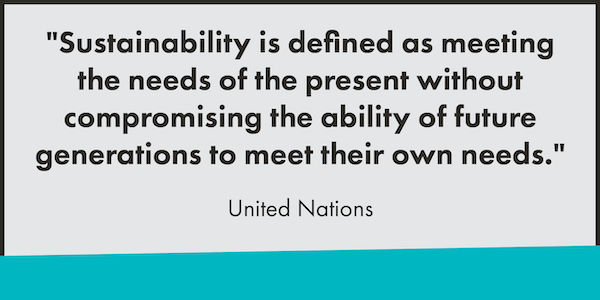
Our company takes that message to heart. We recognize the critical part we play in taking care of our communities, making a positive impact, and reducing our environmental footprint. We want to leave a positive legacy behind that extends beyond our logistics services. This includes our part in taking care of our environment and the communities we touch.
Here’s a glimpse into how we take action to be sustainable.
Paving the Way to Less Emissions with SmartWay
The SmartWay program by the Environmental Protection Agency (EPA) helps companies improve supply chain sustainability and reduce transportation emissions by providing a system to track fuel and emissions so companies can select more efficient carriers and logistics strategies.
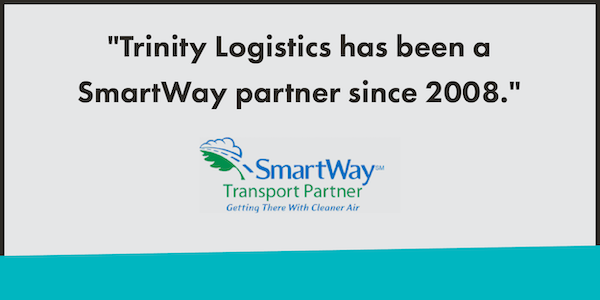
Trinity invested in a SmartWay partnership in 2008, making this our earliest sustainability initiative. This partnership enables us to access and build relationships with SmartWay-certified carriers that commit to tracking and minimizing their emissions. We’re able to leverage that network, empowering our shipper relationships to make sustainable choices by using these SmartWay-certified carriers whenever possible.
Chemical Safety with Responsible CareⓇ
Responsible CareⓇ is the chemical industry’s environmental, health, safety, and security initiative, hosted by the American Chemical Council.
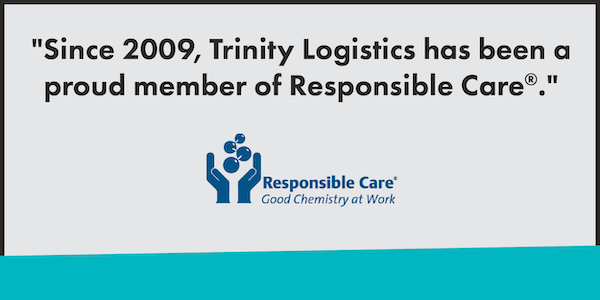
Since 2009, Trinity has been a proud member of Responsible CareⓇ. Some of the ways we take this sustainability initiative into action include;
- carrying pollution liability coverage to cover costs associated with pollution clean-up or other pollution-related liability claims;
- stringent carrier vetting to select the right carrier with the right requirements, like being hazmat-certified;
- ongoing required Team Member training to maintain knowledge of proper procedures, especially regarding chemical transportation.
Offsetting Carbon Footprint in Logistics with ClimeCo
ClimeCo is a non-profit organization that helps companies offset their emissions by donating funds towards sustainable projects.
Trinity Logistics understands that climate change is a pressing issue, so we’re committed to doing our part. In 2022, we began collaborating with Carbonfund, now known as ClimeCo. At the end of each fiscal year, we calculate the electricity usage of our owned facilities. With that calculation, ClimeCo helps us identify sustainable projects to donate to and offset the emissions we produced that year.
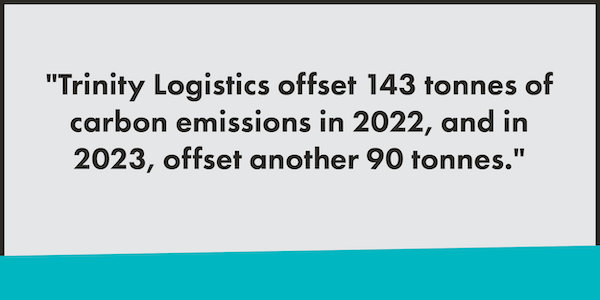
We’ve already made a difference by contributing to the Texas Capricorn Ridge Wind Project and N20 Abatement Project. In 2022 alone, we offset 143 tonnes of carbon emissions, and in 2023, we mitigated another offset of 90 tonnes. That’s a win for the environment and a win for future generations.
Building Sustainability in Our Offices
Sustainability isn’t only about grand gestures; it’s about the everyday choices we make. That’s why we seek out sustainable practices within our own facilities.
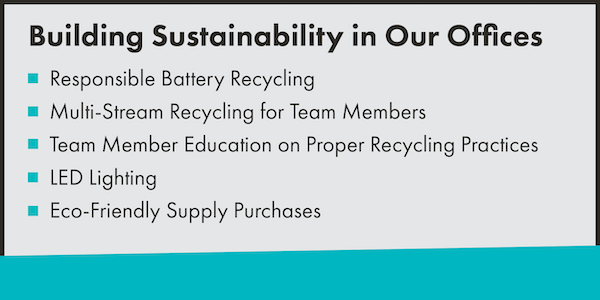
We offer convenient battery recycling through a partnered vendor, ensuring they’re disposed of responsibly. We also ensure any used paint gets recycled instead of ending up in landfills.
We offer multi-stream recycling to our Team Members as well. Each Team Member has their own container to recycle any paper documents, while a large bin outside collects glass and recyclable plastics. Knowledge is power, so we educate our Team Members on proper recycling practices, too.
Our Facilities Team also aims to make sustainable purchases as often as possible. They’ve already converted any lighting in our owned offices to energy-efficient LEDs. They also focus on purchasing eco-friendly supplies that are compostable and certified sustainable. For example, they buy compostable paper plates and takeout containers for our weekly lunches.
Recognizing the Power of Remote Work for A Cleaner Environment
We recognize the many benefits of remote work. It fosters a vibrant company culture, empowers our Team Members with greater flexibility, and contributes to a greener future. By embracing remote and hybrid work positions, we help reduce emissions from daily commutes and cut our office space requirements.
Currently, around 50 percent of our positions offer remote or hybrid options, allowing our Team Members to focus on time with their families, contribute to their communities, and be part of this impactful sustainability initiative.
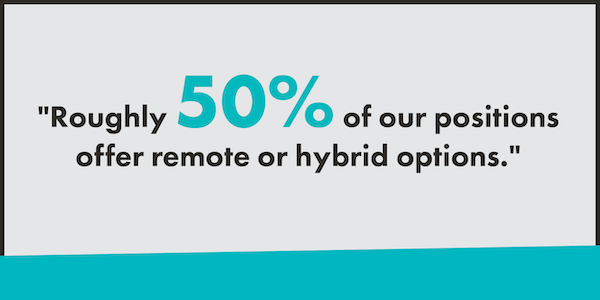
Empowering Shippers with Sustainability
For Trinity, sustainability is about more than our own initiatives. It’s also about helping our relationships find sustainable options in their supply chains.
For each shipment, we’re able to offer guidance on the most efficient transportation modes available. We offer regular business reviews to analyze our shipper relationship’s unique logistics profiles to find and suggest efficiencies. Our Team also works closely with shippers and carriers to tackle deadheading, a large contributor to carbon in the trucking industry.
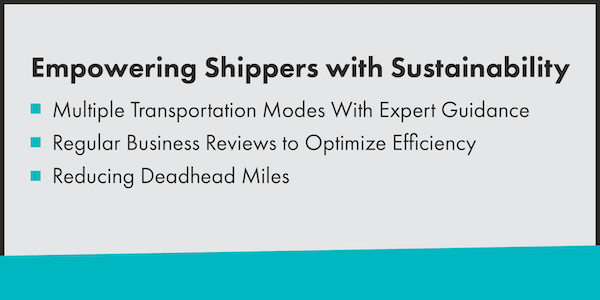
Additionally, we’re always looking to explore new ways to push the sustainability envelope for our relationships. Currently, we’re looking into platforms that can help us provide our shipper relationships an extra avenue to offset their carbon emissions, too, like Patch.io.
Ecovadis – Recognition of Trinity’s Commitment to Sustainability
EcoVadis, a trusted and globally recognized provider of business sustainability ratings, recognizes our dedication. In 2023, they awarded us a bronze medal, placing us within the top 50 percent of companies assessed. While we acknowledge this is a significant achievement, at Trinity, we aim to continuously improve. Our sights are set on achieving a silver rating in 2024, reflecting our ongoing commitment to continuous improvement.
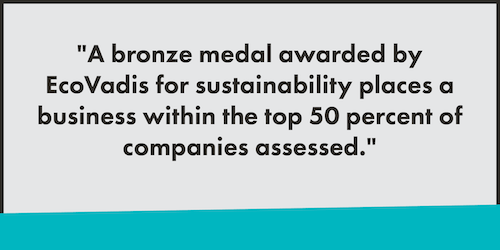
The Trinity Logistics Difference
As our mission statement says, we’re dedicated to “improving lives and supply chains by solving tough problems.” Sustainability is undeniably a complicated challenge. The good news is that our passionate Team Members at Trinity Logistics thrive on tackling tough problems and overcoming obstacles. We’re relentless in our pursuit of solutions, and we won’t stop until we’re satisfied with the results.
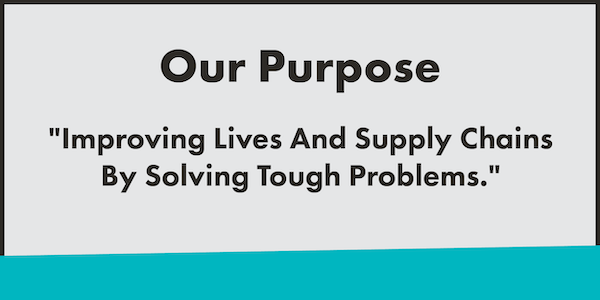
We understand sustainability is a never-ending journey of improvement. That’s why you can count on Trinity Logistics to remain a leader in sustainable practices. We’re constantly expanding our sustainability initiatives and deepening our commitment to a greener future.
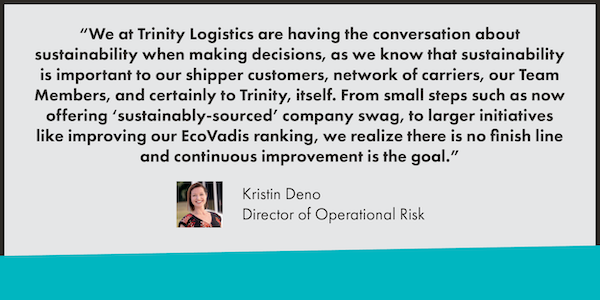
Our dedication to sustainability is just one facet of the Trinity difference. If this is how seriously we take environmental responsibility, imagine the level of commitment we bring to solving your logistics challenges.
DISCOVER HOW WE CAN HELP YOU ACHIEVE YOUR LOGISTICS GOALSSEAFORD, DE, June 16, 2023 – Trinity Logistics, a leading 3PL provider of transportation and logistics solutions, is proud to share its selection as a Green Supply Chain Partner of 2023 by Inbound Logistics. This recognition showcases Trinity’s commitment to sustainability and its efforts to reduce its environmental impact.
“We’re honored to be recognized by Inbound Logistics for our commitment to sustainability,” said Sarah Ruffcorn, President of Trinity Logistics. “We believe that improving our sustainability is the right thing to do, so we’re always looking for ways to reduce our environmental impact in all aspects of our business.”
Each year, Inbound Logistics editors select 75 companies that go above and beyond to prioritize green initiatives and help global supply chains become more sustainable. Inbound Logistics recognizes these companies as dedicated to developing and implementing best practices to leave a positive footprint on the world.
Trinity has a long history of sustainability initiatives. In 2008, the company became a member of EPA’s SmartWay Transport Partnership, a voluntary program that helps companies reduce their greenhouse gas emissions and air pollution from freight transportation. Trinity has also been a member of the American Chemistry Council’s Responsible CareⓇ program since 2009. Responsible CareⓇ is a global initiative that promotes the responsible management of chemicals and their safe use. The program also helps companies improve their environmental performance in areas such as pollution prevention, employee health and safety, and security.
Just last year, Trinity became a CarbonfreeⓇ Partner with CarbonFund, a non-profit that works with its partners to help them become “carbon-neutral” by donating funds to offset their emissions. This year, Trinity expanded its efforts to not only offset the corporate location in Delaware but included the Iowa and Florida offices as well. This year, the company offset 90 tonnes of carbon emissions by donating to the N20 Abatement Project.
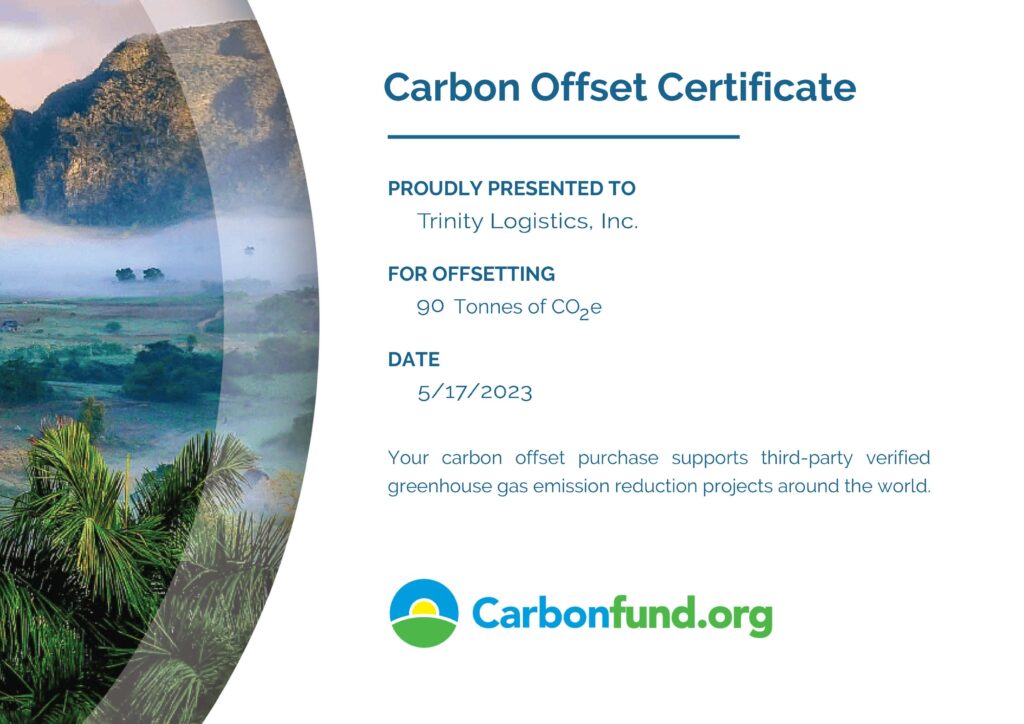
Trinity is proud to be named a leader in the green supply chain space and remains committed to making a positive impact on the environment in all ways possible.
Get a free, no-obligation quote
Learn how to get the job you want post-graduating by elevating yourself as a candidate and effectively selecting the right opportunity.
Today’s market is complex, both for the employer and the employee. The average skilled candidate has a plethora of options to choose from when it comes to finding a new career. In the face of heightened competition for top talent, many employers have placed a greater focus on partnering with colleges and setting their sights on the recent college graduate.
As a recent college graduate, many might be telling you to consider yourself lucky to be coming into the job market at such a candidate-driven time. Yet, this sense of limitless opportunities can feel overwhelming and stressful.
But I’m here to help you. First, we’ll take a dive into how to best position yourself as a top candidate for your dream job.
Then, once we’ve established those ground rules and you’ve successfully landed some offers, we’ll talk through how to select the best employment fit for you and your future goals. No pressure at all; this is only one of the more important decisions you’ll make. It’ll be fun! Let’s jump in.
HOW TO GET THE JOB YOU WANT PART 1: POSITIONING YOURSELF AS A TOP CANDIDATE
Positioning yourself as a top candidate comes down to a few simple things. I’ll categorize it into three parts: Before, During, and After.

Prep
Many take the “apply to every position you come across with little to no prior research” approach. Law of numbers, and eventually, one of them will bite.
Personally, I advise against this method. Instead, sit down and write out what things you enjoy in life to pinpoint the type of role you would thrive in. Next, do a Google search of “best places to work” in your desired work location. Then put those two things together to find jobs you would actually enjoy with a company that aligns with your goals and values.
This will take a little extra time at first, but it’s worth it. In the law of numbers approach, you end up interviewing with any company that replies. Whereas here, you’ll spend more time dedicated to companies you are truly interested in.
Apply
Take a moment to tweak your resume to the job in question. Look for keywords in the job posting and find ways to add relevant ones to your skillsets and prior responsibilities.
I can’t stress this one enough, update any cover letter or objective so it aligns with the job you’re applying for! There’s nothing a recruiter dislikes more than opening a resume for a logistics sales position and reading that your goal is to land a medical billing job.

Ask for details
Ask for the details of your interview from whoever you initially speak with. Make sure you know who you’ll be meeting with, their title(s), the structure of the interview, and if there is anything you should bring with you.
Arrive early
Get there 5-10 minutes before the interview…not after.
Eye contact
Make lots of eye contact during the interview. Make it weird…but not too weird.
Be engaged
Show passion and excitement to be there and be considered for this position!

Follow-Up
Make sure to get emails from those who interview you. Shoot them a follow-up email later that day or the following to thank them for their time and consideration.
If you haven’t heard anything several days later, reach out once more to the most relevant point of contact, expressing your excitement about the opportunity and asking if there’s anything else they need from you.
If you receive a declination from a company, always handle it with grace. Thank them for the opportunity and express interest in being considered for future roles. This will leave the door open for something down the road versus burning any bridges by handling it poorly.
HOW TO GET THE JOB YOU WANT PART 2: SELECTING THE RIGHT OPPORTUNITY
You’ve done it. The offers are rolling in, and now the ball is in your court. You have a couple of days to a week or two to make your decision. Here are some key factors you should use to select the best employment fit for you and your future goals.
Research
Look up company reviews through Indeed and Glassdoor. Any company will preach a positive culture but current and past employee reviews will give you a window into the real-life practice at that company. Most importantly, look for patterns. You’ll always have one or two who have a bone to pick but the patterns can show you if there is a real issue.
Stability
Now more than ever, people want stability in their careers. Research the company on current or past layoffs. This can provide insight. If a company has had some layoffs over the last several years, chances are they are quicker to go that route when the future is uncertain.
Culture
Take a look at the company’s mission statement and overall values. Ask questions during the interview process about promotion opportunities and ask those you interview with for their story.
This can provide insight into how the company views offering internal advancement opportunities. As someone going on 10 years with Trinity, having many lateral and vertical opportunities to promote to different positions and find my true passion in recruiting, it’s very easy to provide candidates with my stories and explain how attainable it can be for them as well.
Once you’ve gathered those stories and that information, use it in your decision-making process. Yes, the initial job and pay matter, but if your goal is long-term career growth, setting yourself up with a company that encourages and supports you will ensure you only have to read this blog once for a job hunt.
Benefits
Money matters, but make sure you find out about the full benefits package and take it all into consideration. For example, a higher base pay with significant out-of-pocket cost in benefits might come in under the slightly lower base offer of another company.
Ask to see the benefits package and ask about their 401K offering and company match. Ask about the company’s paid time off policy. These things might seem insignificant during the interview process, but trust me, they will become very important, very fast, once you start using them.
NOW YOU KNOW HOW TO GET THE JOB YOU WANT – GO GET IT!
Now that I’ve overwhelmed you with details let’s have a quick recap. Whenever this career search starts to feel like it’s too complicated, make it simpler. Go back to the basics.
It’s all about you thinking of the things you enjoy (and also the things you don’t enjoy) and coming up with jobs that would allow you to do those things. It’s about researching each company and remembering it’s the little things that will set you apart from your competition. People want communication. They want intentional action and passion for not only the job in question but your own personal goals and how you plan to achieve them.
At the end of the day, everyone involved in your interviewing process will be just that, people. So, shake off the nerves, update your resume objective, and go find your dream job. And, since you asked, yes, Trinity is hiring. 😊
SEE OUR CURRENT OPPORTUNITIESWhether you’re at a local restaurant, a holiday party, or spending a Friday night on the town, you, or someone you know is having a drink. And no, we’re not talking about a glass of water or soda. We’re talking about alcohol, including beer, wine, spirits, liquors, and liqueurs. What does it take to get alcohol from manufacturing plants to stores and restaurants for consumers? In order to ship alcohol safely, there are many rules and regulations to follow.
Do We Even Drink That Much?
In the United States alone, people who are 21 years and older consumed 7.8 billion gallons of alcohol in 2018, according to a report by the National Institute on Alcohol Abuse and Alcoholism. Breaking this down, means 6.3 billion gallons of beer, 900 million gallons of wine, and 570 million gallons of spirits consumed. So, shipping alcohol is a continued need and one that is only going to grow. Since the pandemic hit in 2020, the volume of consumed alcohol increased at least two percent year-over-year.
The Production
In the United States alone, the alcohol beverage industry handles more than 4 million jobs and generates almost $70 billion in revenue. This number is only going to grow but beers, wine, and spirits are all different for the consumer.
Beer
This sector has been dominated by big brand names ever since the beginning. Big brands like Bud Light, Coors Light, Budweiser, and Corona all make life hard for those small-town local breweries.
While 2021 was a record year for small-town businesses with 710 openings and only 176 of their doors closing across all 50 states, they still face a tall hill to climb. In this situation, it’s David versus Goliath. Big beer companies have the brand reputation, the capital, the marketing, and all the business. Therefore, small breweries must compete not only with them but with other small local breweries to make it in the industry.
However, with everything against them, many consumers prefer a unique-tasting beer compared to the very recognizable Bud Light can.
While small breweries open their doors to everyone, their target audience for their beer is individuals in their twenties, thirties, and early forties. These individuals (especially Millennials) are more likely to try new drinks and prefer ones that have different flavor profiles such as sweet, salty, sour, hoppy, spicy, and more. This shows because, in 2021, the volume growth in small breweries grew by 7.9 percent and produced 24.5 million barrels of beer.
Wine
The wine market is as competitive as the beer field, where big brand names are a household stable with new vineyards and wineries opening across the United States.
Some of the biggest names in this sector are Franzia, Barefoot Cellars, Twin Valley, and more. The wine sector is expected to see significant growth. In 2021, the market was worth $417.85 billion and is expected to grow 6.4 percent year over year. So, while one may face the challenge of competing with big brand names, if a quality product is produced, there is great potential.
Spirits
The spirits industry also referred to as hard liquor, is a sector that made $135.78 billion in 2021. This sector has a lot more variety, including spirits such as vodka, tequila, rum, whiskey, gin, and more. Within each of these categories, they all have well-known competitors, meaning each one presents unique and complex challenges for those within the sector.
But, How Does Shipping Alcohol Work?
Whether you make beer or spirits or are a big brand name or a small business, one thing is for sure, you NEED to ship your product out to the consumers. But what does it take to ship alcohol?
When shipping alcohol you must have certain permits and meet regulations to ship it safely and most importantly, legally in the United States.
What Are the Regulations for Shipping Alcohol?
Here is where things get tricky. When shipping alcohol, you must follow certain rules, but the United States does not have one set of rules for transporting alcohol. This means that all 50 states in the U.S. have different rules and regulations to follow. For example, in Delaware, carriers must abide by the Delaware Office of Alcohol Beverage Control Commissioner rules but carriers traveling through New Mexico must follow the Alcoholic Beverage Control.
Before arranging your shipment of alcohol, you must be aware of each state’s regulations for the transportation of it. Find out what you need to know about a certain state’s requirements by clicking on the link below:
Making Shipping Alcohol Easy with a 3PL
No matter if your company is big or small, selling beer or wine, everyone must follow these rules when shipping alcohol. However, ensuring the carrier has the proper permits can be a pain-stacking task. By using a 3PL, like Trinity Logistics, you’ll gain access to a network of strong carrier relationships and Team Member experts with experience in the regulations for shipping alcohol.
Working with a 3PL means you’ll have someone on your side to help all the backend logistics work so you can focus on making and selling the best product. Plus, we offer a variety of shipping solutions for you, from less-than-truckload shipments to temperature-controlled intermodal, we have the shipping solution you need.
Learn how Trinity can support your businessTrinity Logistics is excited to announce that the company has been recognized as a Top 100 3PL by Inbound Logistics in 2022.
Every year, hundreds of third-party providers submit their credentials to Inbound Logistics to be considered for their Top 100 list. Among the applicants considered, Trinity’s recognition further highlights the company’s growing brand of People-Centric Freight Solutions® among shippers and carriers.
“This year’s theme for our annual 3PL edition: pizza. But think about it. Whether companies need to outsource just a slice or the full pie, there’s a 3PL to meet their needs. And outsourcing supply chain, logistics and transportation solutions to a trusted partner was never more important than during the disruptions of the past few years” said Felecia Stratton of Inbound Logistics.
“We are honored to be named as one of the top 3PLs in the industry,” said Sarah Ruffcorn, President of Trinity Logistics. “Our focus on People-Centric Freight Solutions ® continues to make us a trusted partner for both shippers and carriers. I am proud of our team and how they continue to serve those around them with excellence.”
Trinity consistently strives to be the best by offering its audiences customized logistics solutions through its People-Centric approach. Trinity is honored to receive this recognition as it continues positively representing the company’s legacy by providing excellent service to the logistics industry.
Learn more about what makes Trinity Logistics a great 3PLAbout Trinity Logistics
Trinity Logistics is a Burris Logistics Company, offering People-Centric Freight Solutions®. Our mission is to deliver creative logistics solutions through a mix of human ingenuity and innovative technology, enriching the lives of those we serve.
For the past 40 years, we’ve been arranging freight for businesses of all sizes in truckload, less-than-truckload (LTL), warehousing, intermodal, drayage, expedited, international, and technology solutions.
We are currently recognized on Transport Topics’ Top 100 Freight Brokerage List, a Top 3PL and Cold Storage Provider by Food Logistics, and a Top Company for Women to Work for in Transportation by Women in Trucking.
It’s no surprise that one of the hottest topics in the world lately is the pain felt at the pump. Rising fuel prices have been at an all-time high, surpassing the costs since 2008, and these prices will only continue to climb. As a result, businesses are being forced to pay more to operate, causing a ripple effect for everyone.
Wait, How Did This Even Start?
You may be wondering how fuel prices even got to this all-time high. Well, they can’t be blamed on any specific event or occurrence as many different factors caused fuel prices to surge.
World Conflict
World conflict is one issue affecting fuel prices, specifically those in Western Europe. The Russia-Ukraine war has been brewing for some time now, and due to attacks, the United States among others has stopped imports, like oil, coming from Russia.
Russia is one of the world’s largest oil exporters, exporting nearly eight million barrels in one month. The drastic change in accepting oil imports from Russia has caused the price of fuel to rise because it’s not as available as it once was.
The Dreaded “C” Word
Another catalyst for the spike in fuel prices is the continual effect of Covid-19. I’m sure you’re tired of hearing it, but the world is still feeling the pains of the virus while we aim to return to life. Recently, Covid forced Chinese ports to close for a brief period and now that the ports are opening back up, supply cannot keep up with demand.
As people try to live alongside Covid-19, office workers are going back to in-person work and people are returning to travel after two years of staying put. With more people leaving their homes, it’s causing a greater demand for fuel while our supply is limited.
The Effects of These Issues
Fuel prices are affecting everyone, including consumers, and businesses, but those in the logistics industry are seeing greater challenges. That’s because the logistics sector has seen disruption after disruption. First, with the issues started by the pandemic, then the port congestion once businesses began to reopen, and so on to now with increased fuel prices. This industry has barely had a moment to catch its breath.
Logistics is at a crossroads; with the United States economy looking at a recession, and world conflicts yet to improve, it’s going to be hard for fuel prices to drop back to normal levels until everything balances out.
How Bad is it Actually?
Even though everyone has been hearing and seeing the high fuel prices, how bad are these prices? Well, in June, the U.S. national average price per gallon topped $5, which is 50 percent higher than it was this time last year. Even pre-pandemic prices were at $2.55 average for that month, showing the direct impact that covid and other issues have caused.
These prices only continue to rise when we talk about the cost of diesel fuel. This type is often more expensive than regular gas, and this is what truck drivers use to fill up their tanks. In June, diesel fuel averaged $5.50 per gallon in the U.S., which is a .50-cent increase from regular fuel. While this increase seems small, when truckers are driving over 500 miles per day, the extra cost can add up quickly.
President Joe Biden has tried to take steps to lower fuel prices in the United States. He has called on Congress to do a Federal Gas Tax Holiday, releasing the charges that the federal government has on fuel. Typically, the government charges an 18-cent tax per gallon on gasoline and a 24-cent tax per gallon on diesel, but President Biden has called for the Tax Holiday to give Americans breathing room as they battle other economic issues like inflation.
High fuel prices are not an issue solely faced by the United States. In fact, gas prices in the United States are on the lower end of the spectrum compared to other countries. For example, while the average in June for the United States was $5 per gallon, in Germany, it averaged $8.26 per liter, while one of the highest fuel prices was in Hong Kong, where gas was $10.71 per liter in June.
How Do High Fuel Prices Impact You?
So, how do the rising fuel prices affect those in the logistics industry? Well, let’s take a look.
Shippers
Increased fuel prices mean higher logistics costs because it’s now more expensive to move their products from point A to point B.
Consumers
Consumers see a direct cost increase on products due to fuel prices. Because it now costs more for shippers to move their products to their destinations, they must also raise the price of their products to continue to make a profit.
Carriers
The biggest issue carriers are seeing with the high fuel prices is the impact on their income. Their operating costs have increased due to the rising fuel and product prices. And with rates lower than they’ve been throughout the pandemic, many carriers have decided to put a pause on driving until the market return to normal. This could cause added chaos to the market. Should more carriers halt their work, there could be an imbalance in the industry, causing more backlogs and shipping delays as a result.
Trinity is Here to Help
As an experienced third-party logistics company with over 40 years in business, we’ve worked with many shippers and motor carriers through the ups and downs faced in this industry, including this one. We’ve seen it all and are here to help you through these troubling times.
Whether you’re a shipper looking for better logistics management or a motor carrier looking for dedicated freight to keep you consistently moving, you can find all the solutions you need with our People-Centric approach.
Get connected with us today so you can start having Trinity Logistics, a Burris Logistics Company, by your side, no matter the state of the market.
Learn more about Trinity Logistics Join our mailing listEveryone dreams about what they want to be as a kid when they grow up. Whether it’s a doctor, a famous athlete, or even an astronaut, it’s safe to say we all dream about what our future holds. But one area people often turn a blind eye to is the logistics sector. When people hear, logistics, they often only thinks of truck drivers, dismissing a logistics career as a potential path. In reality, truck drivers are only one role in this industry.
The logistics field is one of the most important in the world. Everything depends on how the logistics sector is running during that period. Logistics is how the new iPhone gets to stores, food on the shelves and at restaurants, or amazon orders from the warehouse to your front doorstep. To say that logistics is critical to our everyday lives is an understatement.
Career Pathways
There are many options for a logistics career outside of driving a truck. While truck drivers are an integral role in the field, the logistics sector has many more career paths available.
Sales
There are several different departments that play their part in logistics with one of them being sales. Logistics companies need salespeople to attract, gain, and retain new business for continued growth. Salespeople are those individuals who current and potential customers interact with first, so it’s important for these people to be driven, and hardworking, but also have the soft skills to win over new customers.
Independent Freight Agents
Perhaps you want more flexibility in your logistics career. If you’re the type of person to enjoy running their own business, then a career as an independent freight agent could be for you. Independent freight agents work with third-party logistics companies (3PL), like Trinity, to work their own book of business while having back-end support available.
Dispatching
Working with carrier companies is very important aspect of logistics. Being able to recruit and grow carrier relationships is important to the success of a business. Jobs within this area often help with getting carriers to their preferred lanes while negotiating rates on those shipments.
But Wait, There’s More…
You may not know this but there’s more to logistics than just arranging freight shipments. There are many administrative support roles available in a logistics career. These can include finance, marketing, human resources, technology, education, customer service, and more. If you’re not a sales-driven individual, then these opportunities may make more sense to you.
What Benefits Can a Logistics Career Offer You?
Untapped Incentives
One huge benefit is the control an individual has when working within this sector, especially in many sales-driven roles. The untapped incentive opportunities are up to the individual to reach. It’s about the drive, pace and execution in the role to increase earnings through incentive programs and help the whole Team win in the market.
Career Growth
Career growth is another benefit to this industry’s potential. No matter which role you start at, you have many opportunities to grow your skills, your knowledge, or even change up your path while remaining in the logistics field.
A Logistics Career is for Everyone
Many careers have specific job requirements on education level, such as requiring a bachelor’s degree or more. But, the logistics field is one for everyone. Many can start at entry level and grow as much as they want along with making a great living too.
Stability
A logistics career is a stable one because the logistics industry is going nowhere. Logistics is one the fastest growing industries and currently employs 1.7 million people, which is only 5 percent of the workforce. Job opportunities are rising as this industry becomes more important for society and looks to improve with technology. With this stability, you’ll never have to worry about not having a job or not having the opportunity for career growth.
Never Be Bored
The supply chain is a swinging pendulum of change and always has different challenges waiting for everyone. We’ve seen this from the covid-19 pandemic, the labor shortages, product shortages, port congestion within the United States, and now Chinese ports being shut down as well. The logistics sector causes everyone to navigate these challenges and think creatively to get to the final destination, thus, you’ll never have a boring day at work! You’ll never have your head down falling asleep or be stuck doing the same thing repeatedly. Because you must adapt daily, you stay on your feet and await the next challenge to avoid.
Work With New Technologies
Because the logistics sector is one that is growing, that means innovation through technology as well. Whether it’s a payment system, booking loads, Customer Relationship Management Systems (CRMS), or new customer and carrier portals, it gives you the opportunity to learn new, innovative systems that will enhance your soft skills as well. This is far from stopping either, as the industry is always looking to find ways to easily streamline customers and create data systems that are user friendly and easy to use as well.
Fulfilling Work
Working in logistics takes a lot of responsibility. Don’t feel too overwhelmed though as high responsibility means high reward. No matter the role you choose, you’ll feel a sense of pride in seeing products you worked with on shelves, in stores, or knowing you helped assist in a FEMA shipment, helping those who faced a natural disaster. This all comes in addition to the satisfaction you’ll receive from those parties you helped.
Flexibility
Logistics is for everyone, meaning you’re not tied to one area of the United States or world. Every company whether big, small, domestic, or international uses logistics to get products from point A to B. You can move almost anywhere and be able to work remotely or for a logistics company in that area. Even the type of workplaces can differ as well. You could be working in a warehouse, factory floor, an open office area, or even from the comfort of your home. The possibilities are endless when it comes to the kind of place and location you could work from in logistics.
The Next Generation
Because the logistics industry is growing, there is major concern about recruiting. Many in the logistics industry are focused on expanding people’s interest into this sector, especially for the younger generations. More colleges offer logistics and supply chain classes and degrees, more logistics businesses are using social media applications like Instagram and TikTok, and new programs like the U21 Truck Driver Apprenticeship program are making huge steps forward in showcasing a logistics career as a good path.
Clearer Than Ever
One factor that spiked this industry’s popularity and knowledge was the covid-19 pandemic. The pandemic started the drastic market changes that we’re still experiencing today since everyone started online shopping more due to the social distancing that was put in place.
From there we’ve continued to see supply chains making headlines due to, delivery times being delayed, product shortages, increased prices, delays, and congestion at the ports, and more.
Now that everyone has seen experience the supply chain affecting them personally, people are more aware of logistics and have a better understanding of how society needs it to run efficiently.
Interested in a Logistics Career?
If you’re looking for a career in logistics at a growing company, Trinity Logistics could be for you. We’re a third-party logistics company (3PL), offering People-Centric Freight Solutions®. Our mission is to deliver creative logistics solutions through a dynamic mix of human ingenuity and innovative technology, enriching the lives of those we serve. To accomplish this, we start by enriching the lives of our Team Members.
We offer an ideal work environment with a causal dress code and an emphasis on Team Member appreciation. Our job opportunities offer you the job stability and more.
If you want to learn more about Trinity’s culture and job opportunities, click below to start your logistics career.
By: Turner Lee
It wasn’t that long ago that Trinity acquired Scottsdale, Arizona-based Team Eagle Logistics as our newest and only West Coast office. While we’re excited to now have an office in Arizona, we’re most excited about introducing you to some of our new Team Members! I had the greatest pleasure in meeting and interviewing these folks and I can tell you that they fit right into our Trinity culture. So, let’s dive right into introducing some of our newest Trinity Logistics experts.

“I’m Tom Szoko and I’m a Business Development Representative. I work to find new customers, bring in new business, and work with our existing customers from Team Eagle to keep that relationship going for mutual benefits.”

“I’m Sylvia Kirchner and I’m a Logistics Assistant. I work in tandem with our lead sales representative and I book freight, or more specifically, schedule the appointments.”

“I’m Eugene Jackson and I’m a Logistics Specialist. I bring options and help move freight, by having a truck ready when a customer needs it for the right price.”
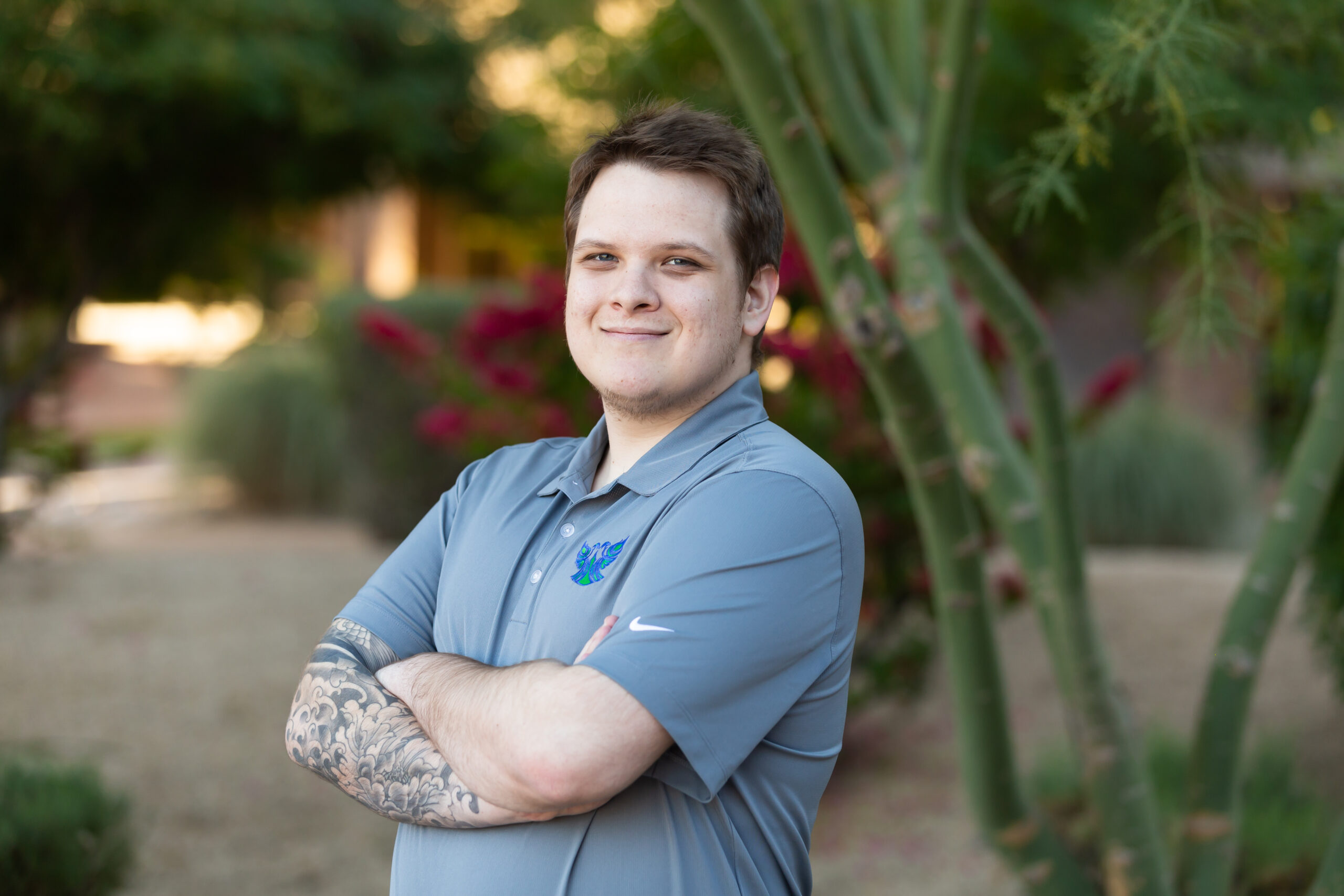
“I’m Dax Hunter and I’m now a Logistics Specialist at Trinity.”

“I’m John Meyer and I’m a Logistics Specialist.”
HOW LONG HAVE YOU BEEN WORKING IN LOGISTICS? HOW DID YOU GET STARTED IN YOUR CAREER?
Tom: “I started as a truck driver with United Van Lines. My dad and brother drove, so I kind of fell into it. I drove over the road for close to 20 years. I was then able to get a position at Atlas Moving Company and worked my way up to Director of Operations over there, but I eventually wanted something different. Team Eagle came up, and it was a good transition to this side of logistics.”
Sylvia: “Almost two years. I started as a social media coordinator for a tire company. And then the pandemic happened, and I decided to quit my job. I then had the opportunity to interview at Team Eagle. Meeting the team, I instantly knew it was going to be a good fit personality and environment-wise. It’s been really cool to see how much we’ve been able to accomplish as an office in the two years since I started working here.”
Eugene: “A little over a year as I started in February 2021. Funny story about how I got into it. Michael Gentile (owner of Team Eagle) and I both go to the same barber. I graduated college, and I let Michael know I needed help finding a job. I went to school for business law, and I’ve always had an interest in logistics but by the time I figured that out it was too late to change my degree. But I still found my way here!”
Dax: “Eight years now. I had a family member that was in logistics and when I graduated high school, she got me an interview. I failed my first interview but then got called back a month later and got my first job at Global Tranz. I was there for almost five years, then at Team Eagle for three years before becoming part of Trinity.”
John: “Since May 2021. I graduated from Iowa State University, and I wanted to move somewhere warmer. I started in customer service, working at places like Target, serving drinks somewhere else, but I wanted to find something in sales, particularly in Arizona. In May, I went through a recruiting process, and then Michael offered the job to me.”
WHAT IS YOUR FAVORITE PART ABOUT THE JOB?
Tom: “Honestly, the relationships I build with customers, along with loving what I do; helping people. It’s what keeps me driving and going every day.”
Sylvia: “My coworkers. It’s lame how much I love these guys; they are like brothers to me. We all get along and it’s a great team environment. It’s nice to have that relationship because then we have a good flow when we work together.”
Eugene: “I love all the people I work with, both in the office and over the phone.”
Dax: “I love talking to people every day. I’m very shy in person but on the phone, it’s different. I’ve been a big gamer my entire life, so I guess the online stuff is easy to me, I like talking to people online, it’s fun.”
John: “My favorite part is conversing with people and the back and forth, like between the carriers, negotiating rates. The push and pull is a fun aspect for me.”
IF YOU DIDN’T WORK IN LOGISTICS, WHAT DO YOU THINK YOU WOULD BE DOING?
Tom: “Life outside of logistics? That’s a great question because I don’t know. My entire career has been in logistics in some nature, it’s what I love, it’s what I do. It’s a good career, and I couldn’t see myself anywhere else.”
Sylvia: “I would probably be working in social media and hating my life. Social media was a 24/7 job, and I was getting burnt out.”
Eugene: “Maybe a mortgage loan officer because those guys can make some money! But I can’t see myself anywhere else.”
Dax: “I’d be living in Austin, gaming. I always wanted to be a streamer, online gamer, so that’s what I’d probably be attempting to do.”
John: “It would probably be anything in sales or commission-based. A big motivation for me is an incentive. I’m also big in investing so maybe I’d invest in more stocks, start a small firm, something like that.”
WHAT WAS THE MOST CHALLENGING THING YOU’VE FACED WHILE WORKING IN LOGISTICS?
Sylvia: “It’s unpredictability. There are a lot of things that can happen, so learning to be proactive. It’s taught me to lean into critical thinking and find out different ways to solve things, and it’s taught me how to be patient too. Logistics is like a bunch of puzzles and well, I like to solve them.”
Eugene: “One time there was this receiver who had a pipe burst in their ceiling and they couldn’t receive for two days. This was an unexpected situation and there was no other facility to load at. In the end, that’s freight sometimes. Sometimes it’s nobody’s fault and there’s always a level of liability and risk with moving freight.”
Dax: “When I was newer, I had a truck break down and there was a learning curve on how to handle a situation like that and make sure everyone is happy and compensated fairly.”
John: “Learning to be more assertive sometimes. When I was newer, I was more passive and would say “okay” in most situations without a second thought. For example, if the customer requests you must be on time for delivery and the carrier says they broke down and can’t be there until 2 pm the next day, I know to ask for proof for the customer to show that the carrier is abiding by their agreement for their delivery time and something unlucky happened.”
DO YOU HAVE AN INDUSTRY THAT YOU LIKE TO WORK WITH MOST?
Sylvia: “Most of my clients are in the beverage industry and it’s great when they come out with new flavors. It’s cool to see when they’re on shelves here and I can see my friends drinking them and know I was a part of that. The other cool thing about working with liquids is during natural disasters. A lot of companies will help ship water with FEMA, so that’s another enjoyment to know I’ve helped that.”
Eugene: “I enjoy flatbed freight. I’ve met a lot of flatbed carriers that I enjoy working with and the actual freight that gets loaded is interesting to me as well. Just random stuff you’re putting on a flatbed, like giant metal cogs, like, what kind of machine does that go to?! They’re huge and weigh 12,000 pounds. I love seeing pictures of the different kinds of flatbed freight loaded.
Dax: “I like to arrange shipments of everything. What’s most interesting is I don’t know what I’m going to arrange every day. I’ve even helped arrange a shipment of dinosaur bones in the past. Everything is interesting!”
John: “I kind of prefer flatbed shipments a bit because the pick-up and drop-off times are easier to coordinate. I do also want to learn more about hazmat or intermodal, all these other ways to transfer freight.”
WHAT’S A FUN FACT ABOUT YOU OR AN INTERESTING HOBBY YOU HAVE?
Tom: “I ride a motorcycle, own a Harley. I get out and ride that whenever I can. It’s a good stress reliever.”
Sylvia: “For about seven years I worked for a top photography studio in Arizona and helped photograph more than 1,000 women. I believe that style of photography was one of the best expressions of self-love and throughout that journey, it was awesome getting to see how many different women were moved by it.”
Eugene: “I like to sail boats. Not like the big boats, but beach catamarans. It’s fun and I even tried to qualify for the Olympics back in 2016, but I didn’t make it. But I could have been an Olympian!”
Dax: “I’ve never seen snow. Born and raised in Arizona. The town I grew up in never got any and I’ve never gone to play in it. I’ve seen it fall but never enough to stick or anything.”
John: “I’m obsessed with sports and sports betting. I’m a big Minnesota Vikings fan and Iowa State fan. One year when I was 14, I impressed the VP of Smithfield with my knowledge of the Minnesota Vikings that he flew me out to suite tickets in Washington DC. I got to sit with Brett Favre’s family and meet them. It was crazy.”
WHAT’S YOUR FAVORITE PART OF NOW BEING A PART OF TEAM TRINITY?
Tom: “I love that the core values of Trinity are almost the same as what we had a Team Eagle; very family-oriented, very customer-oriented, and driven. It’s also great because we’ve spoken with some Trinity Team Members and it’s great to hear people with tenure at Trinity still loving their job. You can tell it’s heartfelt and true.”
Sylvia: “The culture seems so awesome. I love seeing all the different things that Trinity offers, like the team-building events, the office get-togethers, and even the food. It’s amazing when I see all the anniversary emails that people have been here for 25 years. That’s mind-blowing to me. I would love to have that kind of tenure at an office. I also appreciate that there are a lot of opportunities for growth at Trinity and you don’t have to feel like you’re stuck in one position.”
Eugene: “I like how much opportunity there is at Trinity. It’s a much larger company and a lot more networking is available. I’ve had carriers reach out to loads that I never would have had available before. It’s nice being able to have that kind of capacity and career growth. “
Dax: “Having a bunch more friends and being able to expand my horizons. There is so much that Trinity does that we didn’t do before so it’s cool being able to learn and do more.”
John: “One of my favorite parts is how people-centric they are. I saw some of the recent interns were doing videoconferencing with the CEO. That’s so significant that some interns are interacting so personally with the leadership of the company. It’s cool that people higher up in the company will take the time to meet regular Team Members or newer ones starting out. That’s not something you see every day.”
DO YOU HAVE ANY ADVICE TO OFFER THOSE CONSIDERING LOGISTICS AS A CAREER?
Tom: “Be flexible and patient. There are a lot of moving parts that come with logistics. Especially on our side of things. Don’t be afraid to ask tons of questions.”
Sylvia: “If a person is considering a career in logistics, 100 percent do it. It’s a great industry with tons of growth, the people are great, and find the right company. I’m pretty sure why a lot of people look to logistics is because of dependability. It’s not going anywhere. People need to move freight, we need to get goods and services to people, that’s never going to change.”
Eugene: “It can be a lot of work at times so be ready to work. But the rewards to work ratio is great. You get what you put in and it’s a great job to have”
Dax: “Don’t give up on what you want if it’s in logistics. Keep pushing. I kept trying and finally got the job. I love it now. I love logistics, it’s a fun career to get into.”
John: “You’ll learn something new every single day. You learn about people, navigation, and critical thinking. It makes you a better communicator too. Also, remember what people say to you in the industry because remembering those things will help build strong relationships.”
INTERESTED IN JOINING OUR NEWEST MEMBERS AS PART OF TEAM TRINITY?
Scottsdale, Arizona is just one of our seven office locations! If a career in logistics and the Trinity culture seems like the right fit for you, take a look at our current openings.
See what positions we have available for youLOOKING TO WORK WITH SOME OF OUR NEWEST MEMBERS FOR YOUR SHIPPING NEEDS?
Begin a conversation about logistics solutionsThere’s been a lot thrown at supply chains lately. The up and down Covid-19 surges, material shortages, increased consumer demand, and more. And we can’t forget to mention other factors like the new covid variants, port congestion, and dock delays.
Many of you might be wondering what Trinity is doing to stay agile during these supply chain bottlenecks. Let’s first quickly dive into what the supply chain is currently facing, and then we’ll go into how Trinity keeps moving forward.
Current Supply Chain Bottlenecks
Labor Shortages
I’m sure you’ve heard and seen all the effects of the labor shortages today. Whether the companies are big or small, or in fast-food or logistics, every single industry is facing this issue.
Over the past 22 months, businesses have been hit hard with workers’ pandemic-related absences. According to an analysis from the Integrated Benefits Institute, these absences have cost employers more than $78.4 billion. That’s nearly $1 billion every week.
Along with this, the new omicron variant is leading to more staff shortages as people take sick leave and suppliers navigate new restrictions. This includes factoring in China’s zero-COVID strategy, which is likely to continue to disrupt both production and transportation of goods, possibly for the entire year.
However, backorders in many sectors have been filled, but consumer demand may well be cooling now that furloughs have ended, and interest rates are beginning to rise. So, some companies might end up with an oversupply of goods after everything is said and done.
While some people thought that these issues would stay in 2021, the start of 2022 is showing no signs of slowing down these disruptions.
The beginning of this year has been filled with high levels of return volume from the holiday season, along with the suspension of air on-call pickups for packages. All these issues are mixed effects from weather, omicron, labor shortages, and more.
Struggling to Keep Shelves Full
A direct effect of the worldwide labor shortages is businesses struggling to keep shelves stocked. While Covid-19 rampages across the country, it’s not just healthcare and hospitality businesses feeling the effects. Grocery stores are getting gut-punched by the virus as well.
Product shortages have been widespread throughout these 22 months of the pandemic. These shortages have varied in many different products, from toilet paper and hand sanitizer to different types of meat to even bread and soda. As a result, empty shelves have returned at supermarkets as grocery employees call out sick and truckloads of food arrive late.
While all companies feel the effects of empty shelves, shipping companies, like FedEx are especially struggling with on-time delivery of packages and products due to the massive truck driver shortage nationwide. Unfortunately, the only solution currently for these issues is time.
Ongoing efforts are continually in use to increase the recruitment and retention of truck drivers to combat these supply chain issues and stop bottlenecks from occurring.
Struggling Imports
Port congestion and backup is another huge issue facing the logistics industry and the entire world right now. Ports worldwide are seeing high wait times and a lower percentage of on-time delivery. In addition, many containers and ships are forced to dock and wait until they can be unloaded due to labor shortages.
Although many different countries are facing this congestion and delay, no other is struggling more than China. Covid-19 flare-ups in China are straining supply chains as authorities tighten movement restrictions in various cities to stamp out the virus.
Ningbo, a port city of around 8 million, is dealing with a partial lockdown. Its Beilun district has been especially hard hit, and that’s spelled major problems for the shipping industry. According to The Loadstar, “Many truckers live in Beilun, and there are complicated Covid-19 control policies there, so it’s extremely difficult to bring containers in or out.”
With the Chinese New Year approaching, some cargo has been rerouted to the Port of Shanghai, which is already congested, The Loadstar reported. In addition, many smaller shipping services providers have already suspended operations this year ahead of the holiday, which starts on February 1st.
No Signs of Slowing Consumer Demand
As of right now, however, demand is stronger than ever and shows no indications of an immediate post-holiday crash. As a result, changes on the demand front are likely to be slow and steady, leading to gradual market shifts over the next several months.
Combined data from the OTVI and the OTRI indicates that accepted volumes were up three percent year-over-year in early December. Additionally, tender rejections are currently down about 25 percent year-over-year. Rejection rates are at their lowest levels since July 2020.
Decreasing tender rejections indicates that freight is being moved at contract rates, which is a hopeful sign for shippers. Still, with a rejection rate of over 19 percent, strong demand and constrained capacity continue to stress the market.
Unfortunately for shippers, spot and contract rates have continued to climb as demand surges, shortages drag on, and peak retail season continues. In early December, dry van spot rates rose to $3 per mile for the first time ever. Likewise, dry van contract rates reached an all-time high – $2.96 per mile – simultaneously, according to Arrive’s December market update.
Shippers that can create more flexibility in their transportation strategies will fare best as conditions gradually improve in the upcoming year. Moving away from annual RFP’s in favor of shorter contracts, one-way shippers can take full advantage of any upcoming rate drops. While these shippers are also exposing themselves to slightly more risk in the event of unexpected rate hikes, taking a chance might pay off in 2022.
How Trinity is Here to Help
Keep You Updated
At Trinity, we make sure we keep you up to date on all the industry’s information and news. We provide:
- our monthly freight market updates
- weekly news updates
- monthly customer newsletters with industry-specific updates,
- communications from your representative.
Giving You The Trinity Experience
Along with giving up-to-date news and information regarding every industry, we are also here to provide you with exceptional service and communication, especially when facing these bottlenecks.
Hear from some of our Team Member Experts on how Trinity is staying agile during these times:
- “Labor Shortage at the shipper or receiver due to COVID outbreak and/or protocols – day of pickup or delivery. Not a whole lot we can ‘solve’ but providing everyone involved with a friendly, calm, timely, communication goes a long way. We often talk about drivers but one area of our industry that seems to get less press are those shippers/receiver teams. The good ones are gold baby!” – Benjamin Bowne, Sales Executive
- “I would echo Mr. Bowne’s assessment. Handling the conversations with carriers, customers, and warehouse alike with care and empathy goes a long way. Everyone has been impacted over the last year by the pandemic, it’s the experience that our overall Team provides throughout the transaction that has proven invaluable. This is echoed in the feedback we have received from all the parties throughout the pandemic. We care about what we do.” – Chad Eckland, Director of Sales
- “We are being more agile by focusing on internal as well as external adjustments. A large percentage of our staff are working remote to avoid being short manpower due to illness. Those that are in person are participating in higher safety standards within each location. We are asking customers what are their Covid standards, when applicable, and how they are adjusting so we can conform to their needs. We are checking on trends for spiking locations across the U.S. to see how it will affect imports/exports and its affects of capacity in that area. This is a little harder to do but definitely on the radar. If a shipper/receiver is affected, then we prompt carriers to know what expected delays may occur while costing that into what we are offering carrier.” – Tony Austin, Director of Sales
- “In addition to all the good points already mentioned, I would add that even though I always try to consider any and all viable solutions for my customers, I do a little extra now, because of the circumstances, to help educate customers on conditions, market changes, expectations, and challenges. In addition, I emphasize that I do look under EVERY rock to help them get their freight moved by leveraging all of the modes and resources we have available, as well as be thorough in understanding the factors to be considered in moving their freight (flexibility in dates, rates, modes?). I feel like we have more detailed and personalized conversations, and I provide an added level of insight to show customers that I am truly being a partner to help them through this difficult time.” – Kimberly Meadows, Sales Executive
We Are Experts
While this may be our first pandemic, after 40 years of being in this industry, it certainly isn’t our first season of supply chain disruption, high freight volumes and rates, or tight capacity.
We are well versed and experienced in many different situations, and we know when and how to pivot quickly and keep business moving forward. We follow through on our efforts. When issues arise, we work until they are resolved and keep open communication every step of the way.
We Help You Plan
You can always use your Trinity relationship to discuss current and upcoming projects. This helps us give you things to look out for to keep your transportation aspect of business more stable and reliable.
Having a solid relationship with an expert like Trinity will prove to be your largest asset no matter what supply chain bottlenecks you may face.
If your ready to get support in your logistics with Trinity Logistics, no matter what issue the supply chain has, lets get connected.
By: Christine Morris
At the time this article is being published, it’s been 22 months, just shy of 2 years, with Covid-19. As time has passed and treatments and vaccines have become available, most (though not all) of life has returned to normal. A “new normal” as many now call it. In-person gatherings and events have returned, remote and flexible workstyles have become the new norm, kids are back in school, and online shopping and inflation have rapidly risen. So, what are we wishing wasn’t part of this “new normal”? Supply chain disruption.
The Start of Supply Chain Disruption
As COVID-19 began to spread, governments responded with lockdowns. Nonessential businesses closed, and panicked consumers bought out paper products, soap, and disinfectants. With many businesses closed or down to a skeleton crew, this meant longer transportation times. To make do, alternative routes and modes were sought out, but even those became backlogged too. Shipping networks started to become strained. With people staying home and governments offering financial help, online shopping quickly increased.
Amidst the waves of Covid-19 came more supply chain disruption. There was the Texas freeze that caused many manufacturing plants to shut down. Then there was the Suez Canal blockage which caused severe delays in imports from several days of being blocked. There were the wildfires that raged across the west coast, adding further supply chain disruption. As a result, companies have faced material shortages, increased freight costs, labor shortages, tight capacity, and more.
Current Conditions
In the standard supply chain, raw materials get sent to factories to manufacture goods. Then shipped to warehouses for storage, then to retailers or consumers. Currently, companies face warehouse shortages, labor shortages, tight capacity, exponentially high freight rates, and import delays. It’s gotten so bad for so long that supply chain disruption continues to be a headline in the news. Even people not in or knowledgeable about logistics are talking about it.
The hot topic in the news as of late is the overwhelming demand surging at U.S. ports. Demand for goods has grown so rapidly since the start of the pandemic that it’s equal to adding about 50 million new Americans to the economy, as reported by Insider. Lately, we’ve seen record highs in ships waiting to dock, containers waiting to unload, a lack of storage space to put goods, and empty containers sitting in truck lots and streets, with no place to go.
What to Expect in 2022
Experts continue to say that we will keep seeing supply chain disruption and delays through 2022, if not to 2023. This is because we’ll still have our current supply chain bottlenecks to work through, labor, material, and warehousing shortages to figure out, and Covid-19 remains an issue.
But perhaps we will begin to see some easing of supply chain disruption this coming year. For one, the recently passed infrastructure bill will hopefully begin to affect and strengthen supply chains through its funding into roads, bridges, and ports. More and better infrastructure will help keep certain supply chain disruptions at bay, such as offering more warehousing space and keeping bridges and roads safe and free from closing. Nonetheless, this is longer-term and farther out.
Ideally, what would give the supply chain some short-term relief would be if consumers slowed down a bit with their online shopping. It’s still expected that consumer spending will at one point switch back to travel and entertainment at some port, but no one is quite sure when that may happen.
Tips for Shippers
The past (almost) two years have shown us that supply chains aren’t as resilient as we thought they were. Considering we’re still in the thick of supply chain disruption, it makes sense to improve your supply chain and logistics. Here are some tips you may find useful in keeping your business moving forward until we get back to normal.
Consider Shortening Your Chain
Global supply chains are seeing the worst disruption in their logistics. If anything’s come to light since Covid-19 began, it’s that businesses might want to look into shortening their supply chains. One way to do this is by moving your manufacturing back to the U.S., also known as onshoring.
Identify Any Vulnerabilities
By understanding where any risks lie, you’ll be able to better protect yourself from supply chain disruption. You’ll need to take some time to map out your entire supply chain, down to your distribution facilities and transportation hubs. Though this may be time-consuming and expensive, it can help prevent you from facing a surprise disruption that brings your business to a stop and can be much more costly.
Diversify Your Supply Chain
Once you’ve identified where risk is in your supply chain, you can take that information to address it. This can be done by diversifying your resources. Instead of heavy dependence on one high-risk source, you can add more sources in locations that are not vulnerable to the same risk, so if one gets disrupted, you don’t have to be shut down completely.
Begin Holding Safety Stock (if possible)
This may not be possible for all shippers, and now may not be the best time to start this considering all the current bottlenecks supply chains are facing. But, when possible, this is something that could save you from supply chain disruption down the road.
Keep Up With Timely Communication
Communication is always needed to run your best business, but even more so during this pandemic. Make sure you are communicating properly and timely with your carriers and transportation providers on any new sanitation procedures, requirements, changes in operating hours, or upcoming closures.
Also, Keep Transparency
Be transparent with your audiences. They appreciate it more than you think.
Stay Informed
COVID-19 and many other supply chain disruptions came quickly, and the future remains uncertain. Be sure to stay updated on current developments that may end up slowing down your business.
Find Support in a Transportation Partner
Third-party logistics companies, such as Trinity Logistics, can help you find creative ways to your logistics challenges. We’re experienced in complicated situations and stay knowledgeable on what is going on in the industry. We were quickly able to pivot when the pandemic first hit, so we could keep your business moving forward. We know that even in times of disruption, the shipping industry does not stop, so neither do we.
If you’re ready to gain support in your logistics with Trinity Logistics, no matter the condition of the industry, let’s get connected.
Author: Christine Morris